Some self-described “anti-materialists” have been open and honest about the religious and emotional motivations behind their (strong) anti-materialism. Take the case of the neurophysiologist and Nobel Prize winner John Carew Eccles, who died in 1997.
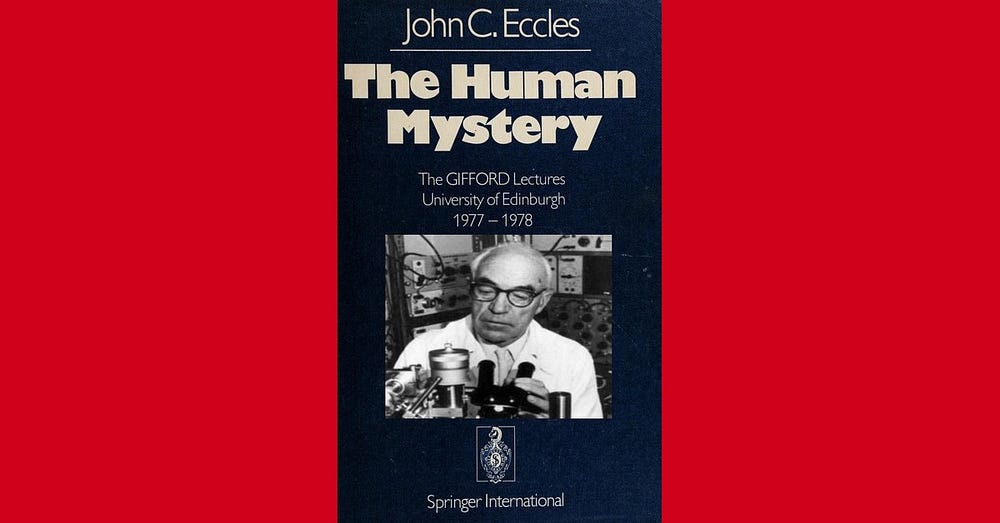
John Eccles (in his book How the Self Controls Its Brain) wrote the following:
“I maintain that the human mystery is incredibly demeaned by scientific reductionism.”
Eccles seemed to be tacitly admitting that it’s not that “scientific reductionism” is misconceived, limited, not the whole story, incorrect or outright false. It’s simply that it demeans human mystery.
However, it can be supposed that anti-materialists could now say that materialists aren’t honest and open about their own anti-religious and emotional motivations.
So surely the best remedy here is to suggest that both parties should stick to arguments and the data instead…
However, clearly John Eccles himself didn’t do that.
Of course, there’s also a problem with criticising Eccles’s positions.
Eccles was a scientist who performed research that lead to him receiving the Nobel Prize in 1963. [See here.]
I, on the other hand, am not a scientist. And I haven’t won the Nobel Prize.
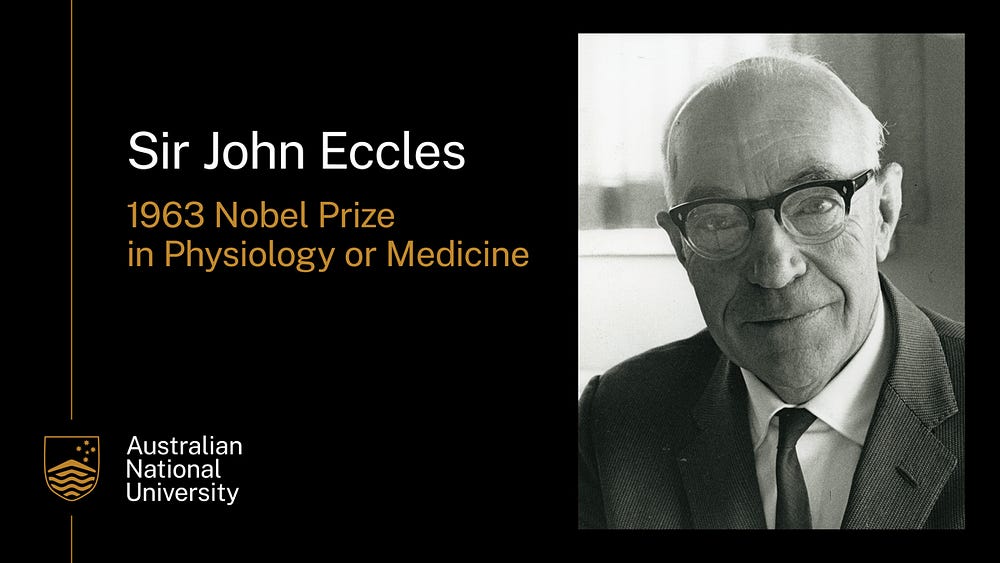
So self-described “anti-materialists” and religious people have been keen to point out Eccles’s scientific credentials in debates like this [see here] — as they also are when it comes to those other scientists who they believe endorse anti-materialist, religious, idealist, dualist, etc. positions.
Of course, most of the people who vocally and rhetorically endorse Eccles’s positions — and the positions of other supposedly anti-materialist scientists — aren’t scientists or people who’ve won the Nobel Prize either. Yet that doesn’t stop them from commenting on these issues.
So any focus on scientific credentials here is hopeless.
Another reason for making that claim is that if Eccles’s many scientific credentials are clinching or decisive in this debate, then what of the credentials of equally-qualified scientists who’re taken to support materialist positions — or at least positions which criticise religion, dualism, idealism, etc?
What’s more, I’m being neither controversial nor original in my claims about Eccles’s motivations.
Take this bit of biography:
“A ‘sudden overwhelming experience’ [] during [John Eccles’s] first year at medical school took the form of a mystical feeling of existential wonder that owed much to his devout Catholicism and inspired him to be a neuroscientist.”
And, elsewhere, there’s the following:
“Eccles was, for much of his life, a practicing Roman Catholic, although he did not always attend mass. However, he retained a deep sense of the reality of mystery, and of a spiritual realm, that for him left scope for theology in addition to science. Unlike many scientists, he did not think that science alone could fully understand the universe, or the mystery of life.”
In any case, Eccles’s positions on dualism, “World 2”, the sins of materialism, etc. aren’t themselves scientific — they are philosophical. Indeed, some commentators have even claimed that they aren’t really philosophical either — they’re religious.
It’s important to state here that there is literally nothing in Eccles’s actual science (i.e., in his published papers) that points toward his views on “human mystery”, his dualism (or trialism), World 2, etc. At least there’s no necessary or direct link between Eccles’s science and all these things.
Thus, Eccles’s scientific credentials don’t really help much in these debates. Or at least his scientific credentials don’t make every word he uttered on these issues gospel…
Sure, exactly the same claim holds when supposedly materialist scientists utter critical words about religion, dualism, idealism, etc.
So now let’s return to the opening passage.
Scientific Reductionism Demeans Human Mystery?
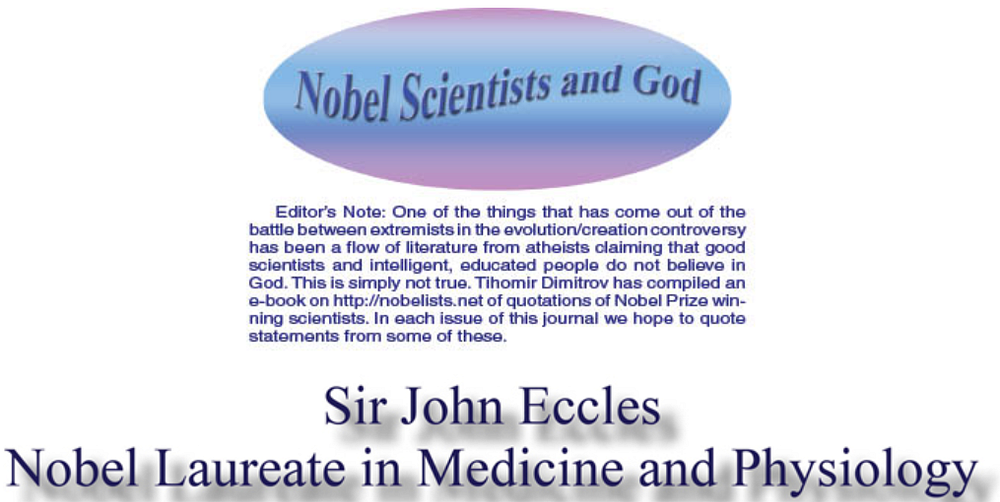
To repeat Eccles’s words:
“I maintain that the human mystery is incredibly demeaned by scientific reductionism.”
Added to that passage, we also have the following from Eccles’s 1989 book Evolution of the Brain: Creation of the Self:
“I believe that there is a fundamental mystery in my existence, transcending any biological account of the development of my body (including my brain) with its genetic inheritance and its evolutionary origin. [] I cannot believe that this wonderful gift of a conscious existence has no further future, no possibility of another existence under some other unimaginable conditions.”
As stated, Eccles seems to be openly saying that it’s not that “scientific reductionism” is misconceived, limited, not the whole story, incorrect or just plain false. It’s simply that it demeans human mystery.
There is, of course, another option:
Scientific reductionism demeans human mystery, and it is also misconceived, limited, not the whole story, incorrect, and/or false.
However, if people already believe that scientific reductionism demeans human mystery, then perhaps some of them will go out of their way to find data and arguments which purportedly show that scientific reductionism is also scientifically misconceived, limited, not the whole story, incorrect, and/or false.
So what, exactly, did Eccles take scientific reductionism to be?
Eccles continued in the same vain with these words:
“[W]ith its claim in promissory materialism to account eventually for all of the spiritual world in terms of patterns of neuronal activity.”
That passage is hardly a riposte to materialism. It’s simply a statement of what Eccles took the materialist position to be.
Yet Eccles seems to have assumed that the very stating of the materialist position would show his readers how deeply suspect it is. That is, the very attempt to account for what Eccles calls the “spiritual world” in terms of “patterns of neuronal activity” is itself suspect - regardless of data, facts, evidence, experiments (or tests) and arguments.
Of course, it must now be said that Eccles did provide arguments to back up his anti-materialist position elsewhere. (Whether they were successful or not is another matter.)
Eccles: First-Rate Scientist & Schoolboy Philosopher
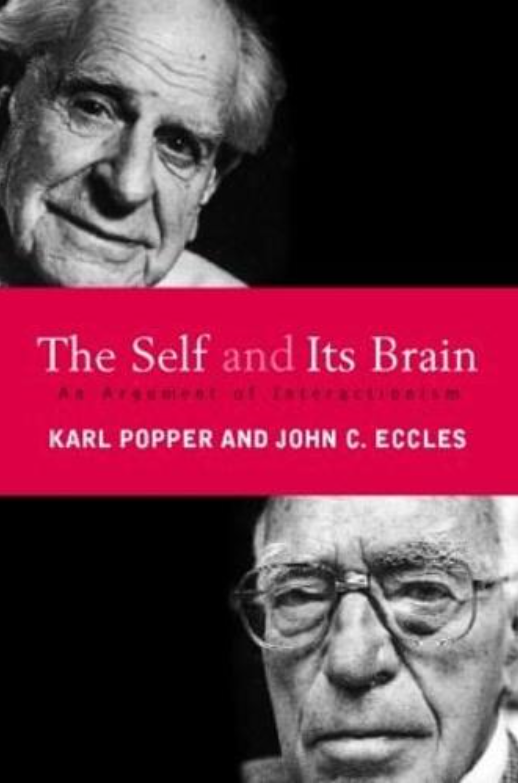
Eccles again lurched into a rhetorical — and even incantatory — mode when he wrote the following in his book (which has already been quoted from) Evolution of the Brain: Creation of the Self:
“This belief must be classed as a superstition [] [W]e have to recognize that we are spiritual beings with souls existing in a spiritual world as well as material beings with bodies and brains existing in a material world.”
So materialists — and many others — have classed views like Eccles’s own as being “superstitious”, and also driven by “prior religious beliefs”. That is, such beliefs are prior in the sense that many (even most) anti-materialists held them long before they indulged in any science or philosophy. (This is certainly true of Eccles himself, as can be seen from the earlier biographical extracts.)
Now, guess what, such anti-materialists return the favour by saying that the belief in materialism is itself (or is also) a “superstition”.
Eccles elaborated here:
“Promissory materialism is simply a superstition held by dogmatic materialists. It has all the features of a Messianic prophecy, with the promise of a future freed of all problems — a kind of Nirvana for our unfortunate successors.”
Apart from Eccles’s extreme rhetoric, I myself have never once thought of materialism as promising a future free of all problems. Indeed, I’ve never read any materialists saying anything like this — even in their own words. (The closest philosopher I know who comes to saying this is Paul Churchland. He does so when he waxes lyrically about how his “eliminative” approach would lead to untold benefits for society. See here.)
So perhaps it depends entirely on which materialists Eccles had in mind. It also depends on whether the people he had in mind were materialists in any uniform — or clear — way in the first place.
[Often the critics of materialism class people as “materialists” even when such people don’t class themselves that way. This is particularly true of the idealist Bernardo Kastrup, who seems to class literally all non-idealists as “materialists”. See here.]
But let’s return to Eccles’s words “the materialist superstition”, “dogmatic materialists”, “Messianic prophecy”, “a kind of Nirvana”, etc.
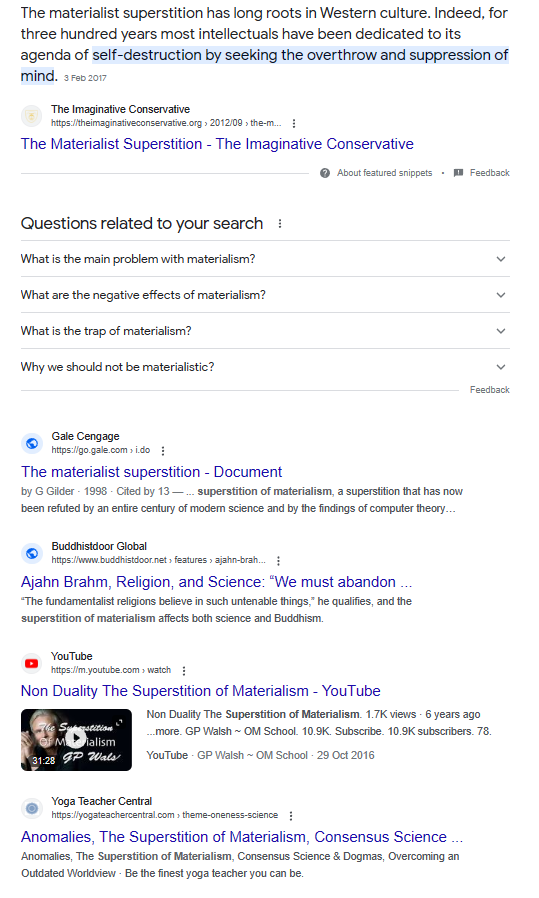
These words are cheap, easy and rather predictable.
[See how often the phrase “superstition of materialism” has been used by other “anti-materialists” here. There are over 12 Google Search pages — of 10 links to each page — which cite this exact phrase. Talk about a meme.]

Now take the following very-similar passage in which Deepak Chopra uses the same techniques when he too talked about the “superstition of materialism”.
In a commentary on Barnardo Kastrup’s Why Materialism is Baloney, Chopra wrote:
“Bernardo Kastrup’s book is another nail in the coffin of the superstition of materialism.”
This is an example of the tried-and-tested technique which many anti-materialists — along with those (it must be added) who reject evolution — employ on a regular basis.
To put it in a simple form.
If a materialist, “evolutionist” or atheist accuses a spiritual idealist, religious person, or New Ager of x, then the latter three will accuse the former of being x too. Thus, there have been lots of spiritual idealists, religious people and New Agers who’ve accused materialists, evolutionists and/or atheists of having “faith” in materialism (or faith in evolution or atheism). Indeed, they’ve also stated that “materialism [or atheism or evolution] is a religion”.
This kind of thing happens at a lot at infant and junior schools. That is, when a little kid accuses another little kid of being x, then that other little kid then accuses the accuser of being x too.
In any case, it can easily be argued that very few spiritual idealists, religious people, New Agers, etc. genuinely do believe that materialism, atheism or evolution is a religion or that people believe in material, atheism or evolution purely on faith. Of course, it must be admitted that there will be exceptions to this in that at least some materialists, atheists or evolutionists will use materialism, atheism or evolutionary theory as a literal substitute for religion. Yet the comparisons between religion and materialism, atheism and/or evolution are often so vague, tangential and rhetorical that, in most cases, I doubt that these claims are even believed by most of the anti-materialists who actually state them.
Still, to claim that materialists, atheists and evolutionists have faith in what they believe is extremely useful, and it scores many points.









No comments:
Post a Comment